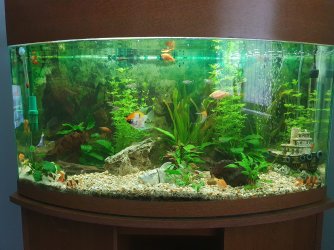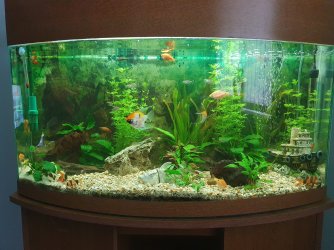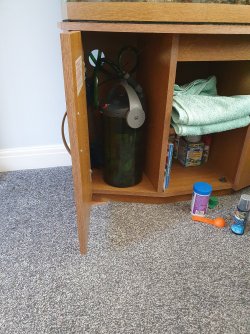Hello everyone, it is my first time posting on a forum so please bear with me.
We have a 160L well planted tank with a Large external filter. I clean the filter every 6 months/when it needs doing. Unfortunately I don't know the speficiations of the filter as it was given to us as a gift, along with the tank. I do weekly water changes and treat my water based on the strip tests. I use Tetra EasyBalance, Microbe-lift Aqua Balance Nitrate Remover, Aquadur minerals for the GH and Aqua Care Bio Boost.
We have 5 rosy barbs, 4 clown loach, 7 rummy nose tetras, 4 congo tetras, 2 black neon tetras, 1 neon tetra. 1 ghost knife fish, 3 catfish, 2 bristlenose pleco, 1 red tailed black shark and 4 honey gouriamis. The loaches, plecos, angels and knife fish are relatively small, vary in size and aren't any bigger than 3-4 inches. The gouriamis are fully grown and most of the tetras are fully grown. I feed them 4 small cubes of frozen bloodworm twice weekly and do a mixture of flakes, mini granules and catfish pellets the rest of the week. All my fish appear to be eating well and even the knife fish loves the granules. There is plenty of hiding places for my fish with rocks, boats and tall plants.
Now my problem is that my tetras are going missing. They all vary in size, rummys, neons & congo have gone missing over a period of time. I literally bought 5 congos the other day and now I have 4 (they are relatively big in size) am I doing something wrong? Could they be jumping? Being eaten? I am at a complete loss as to what is causing my tetras to disappear without a trace. I've spent hours searching the tank and the area surrounding the tank. I would really appreciate someone's help on this as we've had the tank nearly 12 months now and I don't want to see my fish die. The guy at Maidenhead Aquatics said that the congos and gouriamis should be happy in our tank, despite us telling him about the other fish we already had.
Any advice is much appreciated. Thanks
We have a 160L well planted tank with a Large external filter. I clean the filter every 6 months/when it needs doing. Unfortunately I don't know the speficiations of the filter as it was given to us as a gift, along with the tank. I do weekly water changes and treat my water based on the strip tests. I use Tetra EasyBalance, Microbe-lift Aqua Balance Nitrate Remover, Aquadur minerals for the GH and Aqua Care Bio Boost.
We have 5 rosy barbs, 4 clown loach, 7 rummy nose tetras, 4 congo tetras, 2 black neon tetras, 1 neon tetra. 1 ghost knife fish, 3 catfish, 2 bristlenose pleco, 1 red tailed black shark and 4 honey gouriamis. The loaches, plecos, angels and knife fish are relatively small, vary in size and aren't any bigger than 3-4 inches. The gouriamis are fully grown and most of the tetras are fully grown. I feed them 4 small cubes of frozen bloodworm twice weekly and do a mixture of flakes, mini granules and catfish pellets the rest of the week. All my fish appear to be eating well and even the knife fish loves the granules. There is plenty of hiding places for my fish with rocks, boats and tall plants.
Now my problem is that my tetras are going missing. They all vary in size, rummys, neons & congo have gone missing over a period of time. I literally bought 5 congos the other day and now I have 4 (they are relatively big in size) am I doing something wrong? Could they be jumping? Being eaten? I am at a complete loss as to what is causing my tetras to disappear without a trace. I've spent hours searching the tank and the area surrounding the tank. I would really appreciate someone's help on this as we've had the tank nearly 12 months now and I don't want to see my fish die. The guy at Maidenhead Aquatics said that the congos and gouriamis should be happy in our tank, despite us telling him about the other fish we already had.
Any advice is much appreciated. Thanks







 We care about our (and your) fish.
We care about our (and your) fish.